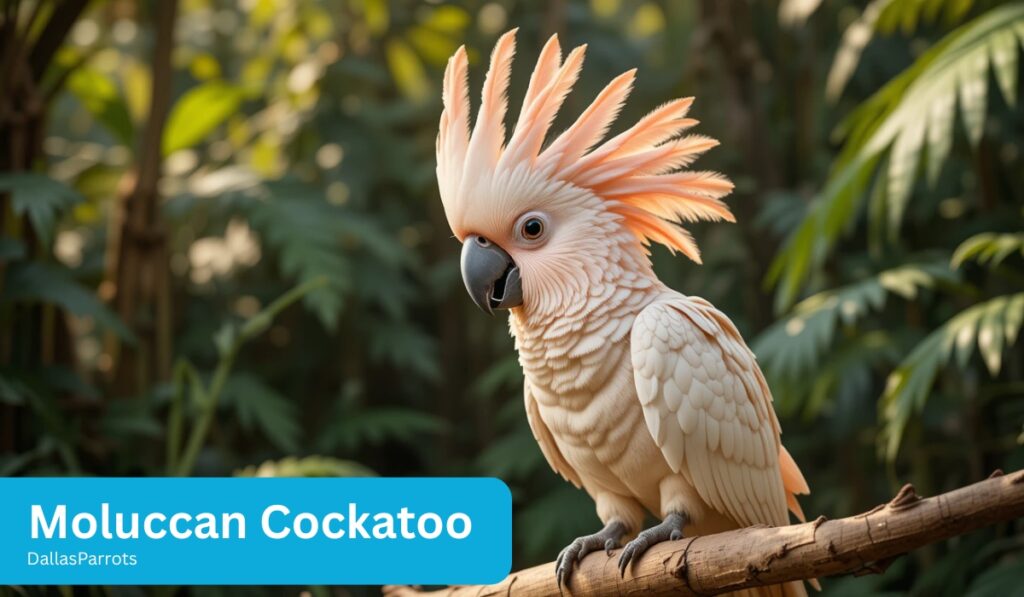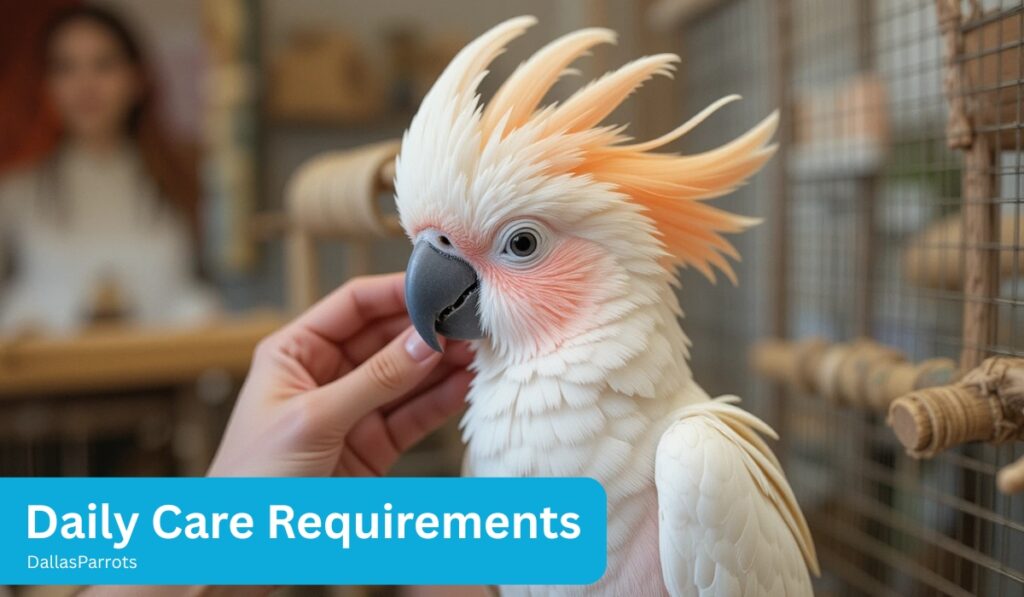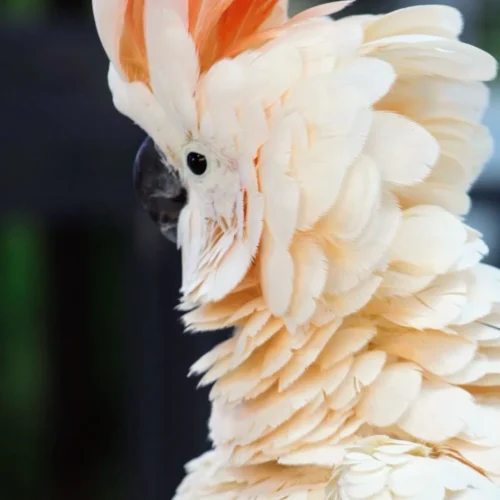

Moluccan Cockatoo Price, Lifespan, Care & Complete Guide
Moluccan Cockatoo, also known as the Salmon-crested Cockatoo (Cacatua moluccensis), is an extraordinary bird that stands out in the parrot world due to its intelligence, emotional complexity, and striking appearance. Native to the Moluccan Islands in Indonesia, this bird is instantly recognizable by its vibrant, peach-colored crest that fans out dramatically when the bird is excited or alarmed. These large, white parrots are admired not only for their beauty but also for their highly social nature and the strong emotional bonds they form with their human companions.
What makes the Moluccan Cockatoo so captivating is its affectionate personality. Known for being incredibly loving and devoted, this bird thrives on interaction and attention. They have a unique way of expressing themselves, with their powerful vocalizations and exuberant displays, making them a joy to watch. However, their affectionate nature also means they can be quite needy, often craving constant companionship and emotional connection. With proper care and attention, the Moluccan Cockatoo can become a loyal and lifelong friend, creating a bond that lasts for decades.
Buy Our loving Moluccan Cockatoo at Dallas Parrots
Looking to welcome a loving, intelligent parrot into your home? Check out our stunning Moluccan Cockatoos at Dallas Parrots. Raised with care, fully socialized, and ready to form deep bonds, these beautiful birds are the perfect companions for dedicated bird lovers.
Moluccan Cockatoo Lifespan
Moluccan Cockatoos are among the longest-living parrots in the world. Their lifespan typically ranges from 60 to 80 years, with some individuals living even longer when provided with the proper care and environment. This remarkable longevity makes them a lifelong commitment for owners, as they will likely be a part of the family for several decades.
Influencing the Lifespan of Moluccan Cockatoos
Proper Nutrition: A balanced diet plays a critical role in ensuring a long and healthy life for a Moluccan Cockatoo. Their food must include fresh fruits and vegetables, high-quality pellets, as well as seeds or nuts. Fruits like apples, berries, and grapes, as well as leafy greens such as kale and spinach, provide vital nutrients and antioxidants to keep them healthy. It is important to avoid overfeeding high-fat seeds like sunflower seeds, which can lead to obesity and other health issues. Additionally, providing calcium supplements is key for their bone health, especially for females who may need extra calcium during the breeding season.
Regular Veterinary Checkups: Regular veterinary visits are essential for maintaining the health of your Moluccan Cockatoo. An avian veterinarian can detect any health issues early on, whether it’s a potential respiratory infection, nutritional deficiency, or signs of stress. Routine checkups ensure that your bird receives the necessary vaccinations, parasite control, and preventive care. Keeping an eye on their general health through regular vet visits is crucial to extending their lifespan. Additionally, many health issues, such as feather plucking or respiratory problems, can be linked to stress or poor environmental conditions, so a vet can provide guidance on improving those factors.
Mental Stimulation: Moluccan Cockatoos are highly intelligent birds, and like other parrots, they need daily mental stimulation to remain healthy and happy. Without sufficient mental challenges, these birds may become bored and engage in destructive behaviors, such as feather plucking or excessive screaming. Engaging toys, puzzles, and foraging activities can keep their minds active and prevent boredom. Regular training sessions that include commands and tricks are also an excellent way to provide stimulation while strengthening the bond between you and your bird. The more mentally engaged they are, the less likely they are to develop stress-related behaviors that could impact their health.
Low-Stress Environment: Moluccan Cockatoos are incredibly sensitive to stress, and a stressful environment can significantly affect their health and longevity. Loud noises, sudden changes in their environment, or neglect can lead to anxiety, depression, or aggressive behaviors. A calm and predictable environment, where the bird feels safe and loved, will help to reduce stress levels. These birds do best in settings that provide them with regular care, opportunities for socialisation, and time away from the cage. It is also essential to avoid exposing them to frequent loud noises or chaotic household situations, as this can cause undue stress and shorten their lifespan.
Factors That May Reduce Lifespan
Poor Diet and Malnutrition: A poor diet is one of the leading causes of shortened lifespans in Moluccan Cockatoos. Feeding them an imbalanced diet or relying too heavily on seeds, which lack essential nutrients, can lead to serious health problems. Without sufficient vitamins, minerals, and amino acids, these birds are more susceptible to diseases such as liver failure, heart disease, and obesity. Ensuring they have a well-rounded diet that includes fresh fruits, vegetables, and high-quality pellets is vital to preventing these health issues.
Lack of Exercise: Exercise is crucial for Moluccan Cockatoos to maintain a healthy weight and muscle tone. These birds need ample space to fly and stretch their wings. A small cage or lack of exercise can lead to muscle atrophy, joint problems, and obesity. Giving them lots of time outside the cage to fly, climb, and explore in a secure and watched-over setting is important. Regular physical activity also helps to reduce stress and keeps them mentally stimulated.
Stress-Related Health Issues: Chronic stress can take a toll on the health of Moluccan Cockatoos, leading to immune system suppression, feather plucking, digestive problems, and even heart issues. Ensuring that the bird’s environment is stress-free is essential for their overall well-being. The more attention and companionship they receive, the less likely they are to experience emotional distress. Birds that are left alone for extended periods or neglected may develop behavioral and health problems that could significantly shorten their lifespan.
Appearance and Physical Traits of the Moluccan Cockatoo
The Moluccan Cockatoo is admired for its graceful body, soft pink-tinged plumage, and its dramatic salmon crest, which rises in response to excitement or emotion. This bird isn’t just visually striking—it expresses emotion physically, making it one of the most expressive and captivating parrots in the world.
| Trait | Description |
| Size | Placing it among the larger cockatoo species, Measures around 46–52 cm (18–20.5 inches) in length. Its big size requires ample space to stretch, climb, and fly. |
| Weight | Weighs between 700–850 grams (1.5–1.9 lbs). Monitoring their body weight is essential to prevent health issues related to underweight or overweight.A powerful, flexible beak for cracking nuts, eating, and climbing |
| Plumage | Feathers are primarily white, highlighted with a soft pink blush on the chest. This subtle tint adds to their elegant and gentle appearance. |
| Crest | The salmon-colored crest fans out when the bird is excited or alert, serving as an expressive feature that reflects their emotional state. |
| Beak | A strong, curved beak used for climbing, chewing, and cracking nuts. Additionally, it keeps the beak healthy and naturally worn down. |
| Eyes | Eye color can indicate gender—males usually have brown eyes, while females may show a reddish-brown hue, especially noticeable in mature birds. |
Temperament and Personality
Affectionate
Because of their extreme affection, Moluccan Cockatoos can develop strong emotional ties with those who look after them. They often seek physical closeness and affection, making them one of the most emotionally connected parrots.
Playful and Mischievous
These birds have a naturally playful and curious nature. They love engaging with toys, exploring their environment, and can become mischievous if not mentally stimulated.
Highly Vocal
Moluccan Cockatoos are known for being extremely loud. They use their powerful voice to express excitement, boredom, or emotional needs—making them less suitable for quiet households.
Emotionally Sensitive
They are emotionally intense and can easily become stressed, especially if ignored or left alone for too long. They need gentle handling and constant reassurance.
Routine-Driven
These parrots thrive on consistency. A regular routine gives them a sense of security; sudden changes can lead to anxiety or behavioral issues.
Not for Beginners
Due to their complex emotional and social needs, Moluccan Cockatoos are not ideal for first-time bird owners. They need someone with experience and a strong understanding of parrot behavior.
Social Needs
They are highly social creatures who require daily interaction. Isolation can lead to depression, plucking, and other emotional disorders.
Attention-Seeking
These cockatoos love being the center of attention. If ignored, they will scream, act out, or perform tricks to draw your focus.
Daily Care Requirements

Caring for a Moluccan Cockatoo requires more than just feeding and cleaning; it involves a commitment to maintaining their emotional, physical, and mental well-being. These birds thrive when provided with consistent social interaction, a proper environment, and regular monitoring to detect any signs of illness or stress. The following are essential elements of their daily care:
Social Interaction: Moluccan Cockatoos are highly social and emotional birds. They require 3–4 hours of daily one-on-one time with their owner to stay emotionally balanced. Regular interaction helps prevent boredom, anxiety, and behavioral issues, such as feather-plucking or excessive screeching.
Lighting: Just like humans, lighting has a significant impact on a cockatoo’s health. They need 12 hours of light and 12 hours of dark each day to regulate their circadian rhythm. A consistent light cycle mimics their natural habitat and promotes healthy sleep patterns, reducing stress and promoting overall well-being.
Environment: Maintaining a steady environment is essential to their well-being. To keep them healthy, make sure the temperature stays between 65 and 80°F (18 and 27°C).Temperature fluctuations or extreme conditions can lead to stress and make your bird susceptible to illness.
Observation: Daily observation is necessary to monitor your bird’s behavior and health. Look out for any signs of stress or illness, such as changes in their activity level, eating habits, or feather condition. Prompt action can help address health concerns early and avoid complications.
Routine: The mental and emotional health of a Moluccan Cockatoo depends on its creation of a regular daily routine. Predictable routines reduce anxiety, making your bird feel secure in its environment. Consistency helps them adapt better and strengthens your bond with them.
By meeting these care requirements, you will ensure that your Moluccan Cockatoo remains happy, healthy, and emotionally fulfilled.
Feeding and Nutrition Tips for Moluccan Cockatoos
Maintaining a balanced diet is essential to ensure your Moluccan Cockatoo stays healthy, avoiding both obesity and nutrient deficiencies.
- Primary Diet: Ensure your bird’s diet consists of high-quality pellets for about 60-70% of their daily intake. Pellets are specifically designed to supply every nutrient that is required.
- Fresh Foods: Offer fresh fruits and vegetables like leafy greens, carrots, apples, and berries. These should make up around 20-30% of their diet and help provide vitamins and minerals.
- Occasional Treats: Provide nuts and seeds as treats, but limit these to 5-10% of their diet. To prevent feeding too much, treats should only be given in moderation.
Foods to Avoid:
- Avocado – Avoid feeding it entirely, Toxic to birds.
- Chocolate – Can be harmful, as it contains theobromine, which is toxic to birds.
- Caffeine – Should be completely avoided, as it can cause heart issues.
- Alcohol – Extremely toxic and should never be given to a cockatoo.
- Salty or fried foods – Harmful and can lead to health problems.
- Fresh Water – Always make sure that your Moluccan Cockatoo has access to fresh water. Change it daily to ensure it remains clean and safe for drinking.
Cage Setup and Environment Tips for Moluccan Cockatoos
Creating the right environment for your Moluccan Cockatoo is crucial for their mental and physical well-being. These active and intelligent birds need a spacious and enriching space to thrive. A well-designed cage can help prevent behavioral issues and keep your bird happy and healthy for years to come.
| Feature | Specification |
| Minimum Cage Size | 24″ W x 48″ L x 60″ H — Spacious enough for free movement and wing stretching |
| Bar Spacing | 1″ to 1.5″ — Prevents escape while allowing safe mobilityMeasures around 46–52 cm (18–20.5 inches) in length, placing it among the larger cockatoo species. |
- Materials: Pick a stainless steel or coated cage. These materials are easy to clean. Avoid cages with toxic coatings that may harm your bird.
- Cage Setup: Include natural wood perches for comfortable foot positioning, as well as ladders and swings to encourage physical activity. These tools promote thinking and natural play.. Ensure that you have separate feeding and water dishes to maintain hygiene and prevent contamination.
- Cage Placement: Set the cage in a well-lit, social spot in your home. Birds thrive when they are part of the family activities, but avoid placing their cage in direct drafts or near loud appliances that could stress them. Place the cage in a shaded area to avoid overheating.
Playtime and Mental Stimulation
Mental stimulation is vital for the well-being of a Moluccan Cockatoo. Without it, these intelligent birds can become bored, stressed, and even engage in destructive behaviors like feather-plucking or self-harm. Providing a variety of engaging activities not only keeps them mentally sharp but also strengthens your bond with them.
Regular out-of-cage time, a variety of toys, and interactive training games are key to ensuring they remain happy and healthy. Engaging in social activities and including your cockatoo in family routines can also help prevent isolation and loneliness.
| Activity | Details |
| Daily Out-of-Cage Time | At least 2–3 hours of free flight or supervised time outside the cage. |
| Toys | Rotate toys weekly to keep them interested and avoid boredom. |
| Training Games | Engage in trick training, foraging, and puzzle solving to stimulate their mind. |
| Social Activities | Involve them in family routines and interactions to satisfy their social needs. |
| Boredom Prevention | Mental stimulation is essential to avoid stress-induced behaviors like feather-plucking. |
Noise Level and Vocalization Habits
Moluccan Cockatoos are among the loudest parrots, with a maximum volume of up to 129 dB. Their vocalizations include screams, screeches, and mimicked phrases. They often vocalize during the morning and evening, when they are seeking attention or when they are stressed or startled. Due to their high noise levels, they are not suitable for apartment living or households sensitive to loud sounds.
Bathing and Grooming Needs
Moluccan Cockatoos enjoy bathing and grooming, which is essential for their feather and skin health. Bathing can be done about 2–3 times per week. Regular nail trims, beak checks, and wing trims (only when necessary) are also required for their well-being. Encourage preening by providing clean feathers and natural perches.
Health and Vet Care
Preventive care is key to keeping a Moluccan Cockatoo healthy. Common health issues include feather-plucking, respiratory infections, and Psittacine Beak and Feather Disease (PBFD). Regular annual checkups and emergency visits for sudden changes in behavior or health are essential. Always use an avian-certified veterinarian to provide the best care for your bird.
Training and Communication
Training your Moluccan Cockatoo is essential not only for building trust but also for managing its behavior. The most effective training methods include positive reinforcement, such as rewarding good behavior with treats or verbal praise. Clicker training can be particularly useful for encouraging specific actions, while consistent commands like “Step up” help in establishing clear communication.
You can also teach your bird simple tricks, like wave, spin, and fetch, which further stimulate its mental engagement. Training is crucial in preventing boredom and minimizing behavioral issues like destructive habits or excessive vocalization.
Social Needs and Interaction
Moluccan Cockatoos are highly social birds that thrive on regular interaction. As flock animals, they naturally form strong bonds—often with one person, though they can also connect well with the entire family.
When they feel neglected or isolated, they may show signs such as screaming, feather plucking, or becoming aggressive. These behaviors are clear indicators that your cockatoo needs more social engagement.
To keep your bird happy and emotionally healthy, try the following:
- Spend quality time daily to strengthen your bond
- Arrange playdates with other birds, if possible
- Offer audio or visual stimulation when you’re not at home, such as music or bird-safe videos
Is a Moluccan Cockatoo Right for You?
The Moluccan Cockatoo is a highly demanding and emotionally complex bird, making it ideal for certain types of owners but not for everyone. Below, you’ll find a breakdown of whether this bird aligns with your lifestyle and experience.
Ideal for:
| Ideal Owner Type | Description |
| Experienced Bird Owners | Understand parrot behavior and emotional needs. |
| Dedicated Individuals | Can spend several hours daily on care, training, and interaction. |
| Homeowners with Space | Have ample room and can handle loud vocalizations and exercise requirements (not ideal for apartments). |
| Long-Term Companionship Seekers | Want a deep, lifelong bond with an affectionate, emotionally attached bird. |
Not ideal for:
| Not Ideal For | Reason |
| First-time bird owners | High maintenance and emotional demands may be overwhelming |
| People with noise sensitivity | Extremely loud and can create a constant din unsuitable for quiet environments |
| Households with very young children | Mischievous nature and need for careful handling may pose challenges |
| Owners who are away for long hours | Thrive on social interaction and may become stressed when left alone for extended periods |
Conclusion
The Moluccan Cockatoo is not just a pet—it’s a lifelong companion with complex emotional and social needs. With a lifespan reaching up to 80 years, this Salmon-crested Cockatoo requires a serious and sustained commitment. Their beauty, intelligence, and affectionate personality make them extraordinary, but only for those who can meet their demanding care routines and tolerate their loud vocalizations.
For more latest update follow our social account:
FAQ's
What is a Moluccan Cockatoo?
The Moluccan Cockatoo, also known as the Salmon-crested Cockatoo, is a large parrot native to Indonesia’s Moluccan Islands. It’s known for its peach-colored crest, intelligence, and affectionate personality.
How long do Moluccan Cockatoos live?
With proper care, these parrots can live between 60 to 80 years, and sometimes even longer, making them a lifelong commitment.
What does the crest on a Moluccan Cockatoo mean?
The salmon-colored crest rises when the bird is excited, scared, or trying to communicate emotion. It’s a key part of their expressive behavior.
Are Moluccan Cockatoos noisy?
Yes, they are one of the loudest parrot species, reaching up to 129 dB. Their calls are powerful and frequent, especially during mornings and evenings.
How often should a Moluccan Cockatoo visit the vet?
Schedule annual checkups with an avian-certified vet, and seek care immediately if your bird shows unusual behavior or health signs.
Can Moluccan Cockatoos talk or mimic human speech?
Yes, they can mimic words and sounds, though they are more known for their expressive personality and loud calls than complex vocabulary.



